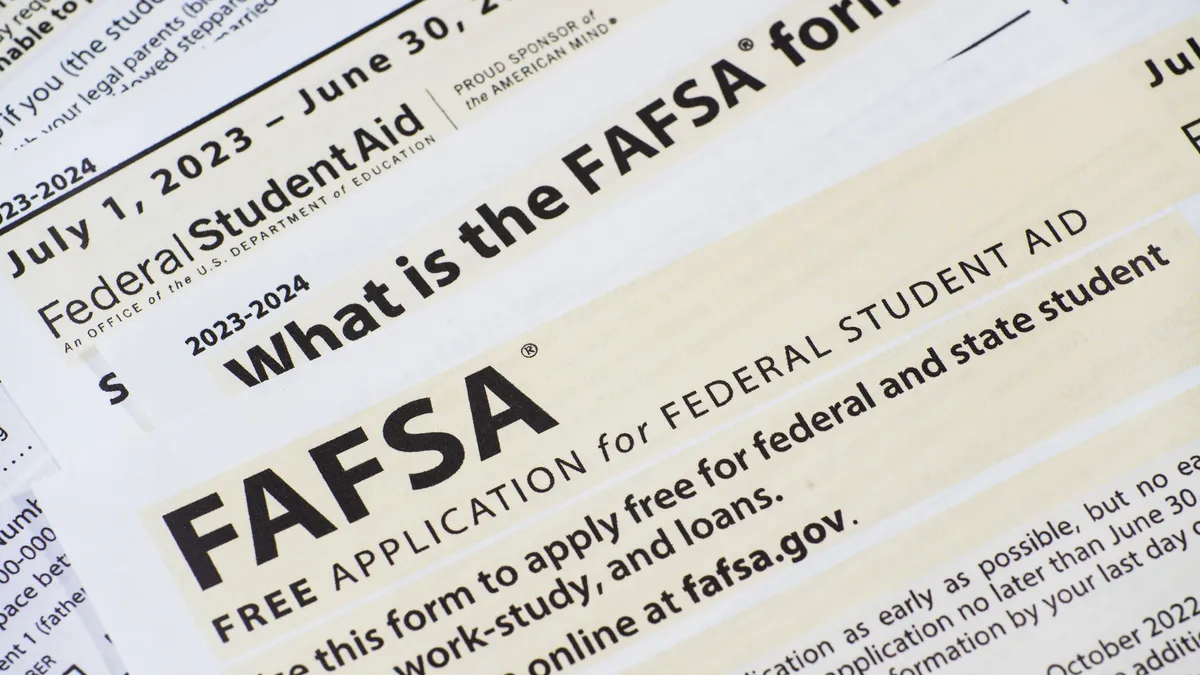Dive Brief:
- Students admitted to the University of Missouri for fall 2021 who didn't submit admissions test scores earned slightly lower GPAs in their first semester compared to their peers who did — but both groups had similar retention rates.
- These were some of the early results of U of Missouri's experiment with test-optional admissions, which was first greenlit in June 2020 amid the tumult of the coronavirus pandemic.
- U of Missouri's faculty council this month approved a multi-year extension of the pilot, until the fall 2025 class.
Dive Insight:
The spread of the coronavirus impeded students from taking the SAT and ACT for admissions, prompting colleges across the U.S. to relax entrance exam requirements.
Many of these test-optional and test-free policies remain in effect, the latter meaning that institutions won't accept scores at all. More than 1,800 colleges aren't mandating the exams for fall 2022, according to FairTest, an organization advocating for limited use of standardized assessments. This count includes those colleges that were test-optional before the pandemic.
Some of the test-optional rules are temporary. Colleges are trying out the policies, sometimes over a couple of years, as a precursor for potentially making them permanent.
Data from these pilots are beginning to trickle out, including from the University of Wisconsin-Madison. The state's flagship institution found test-optional admissions bolstered application numbers, but it didn't diversify the applicant pool in terms of race or income level versus previous admissions cycles.
Meanwhile, the Massachusetts Institute of Technology, which last month became one of the first top-ranked institutions to abandon test-optional admissions, said standardized tests help accurately predict its students' success.
Critics of entrance exams accuse them of being racist tools that reinforce barriers for underrepresented students and favor wealthy families who pay for extensive tutoring. Testing providers, the ACT and College Board, which owns the SAT, have defended their products, saying they help link vulnerable students to scholarship opportunities and allow them to demonstrate academic abilities outside of coursework.
U of Missouri's test-optional data suggests minor differences between the academic records of students admitted with and without test scores.
The institution reviewed the GPA and retention rates of more than 4,800 first-time, full-time students in the fall 2021 class.
Of those students, 986 did not provide test scores. In their first semester, they posted an average 3.08 GPA. This is compared to 3,817 students who did submit scores and had an average 3.29 first-semester GPA.
The retention rates of these two groups differed by a little more than 1 percentage point — 94.4% of students who provided scores stayed enrolled versus 93.2% of those who did not submit scores.
For both bands of students, non-Missouri residents performed better academically.
Akil Bello, FairTest's senior director of advocacy and advancement, said U of Missouri's data demonstrates that the academic performance of the two student groups is relatively equal.
Likely those who didn't offer scores are the ones facing financial and social challenges, so it's unsurprising their GPAs were slightly lower, he said.
"This confirms what we already knew," Bello said.
A U of Missouri spokesperson declined to make an enrollment management official available for an interview Tuesday.
The chair of the faculty council did not respond to a request for comment Tuesday. The data on the test-optional pilot was presented at the group's meeting early this month.
A summary document says extending the pilot through fall 2025 will enable the institution to fully grasp the effect of test-optional admissions on retention and four-year graduation rates.
It also states more data will improve the university's methods for predicting academic success, which in turn will facilitate better-informed admissions decisions.
Bello said years' worth of data will enable the institution to judge whether the students were outliers.
"But it would be a pretty substantial group of students who are outliers," Bello said.












